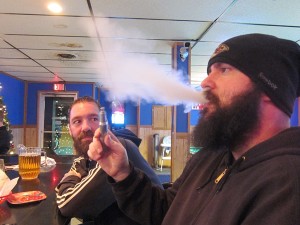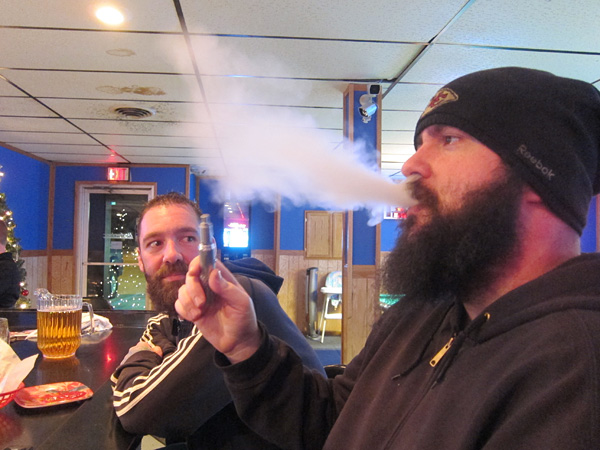
FDA soon expected to propose regulations; Miller urges state lawmakers to ban sales to minors, add e-cigarettes to the Iowa Smokefree Air Act, and address tax issues
CEDAR RAPIDS – Attorney General Tom Miller today urged the Iowa Legislature to ban electronic cigarette sales to minors, add them to the Iowa Smokefree Air Act, and determine whether the state should tax the products higher than the standard state sales tax rate.
E-cigarettes are battery operated products that heat liquid nicotine, derived from tobacco plants, into a vapor that the user inhales.
“Over the past several years e-cigarettes have developed technologically, and they have grown quickly in popularity,” Miller said. “Our state laws, regulations and policies don’t address these products, and I think it’s time for the legislature to begin the conversation.”
Ban Sales to Minors
“I am not calling for a ban on e-cigarettes, but I am calling on state lawmakers to stop allowing their sales to minors,” Miller said. Miller added that, unlike traditional tobacco products, there are no state or federal age restrictions that prevent children from buying or using e-cigarettes.
Smokefree Air Act
Miller is also calling on the legislature to include e-cigarettes in the Iowa Smokefree Air Act. “Our office gets questions from government entities and the private sector on how, if at all, the Smokefee Air Act applies to an e-cigarette,” Miller said. “The simple answer is that the law doesn’t address it.” Four states, including Arkansas, New Jersey, North Dakota and Utah, have included e-cigarettes in their indoor smoking bans.
Last month, the University of Iowa Faculty Council discussed proposing rules that would address e-cigarette use on campus.
“The University of Iowa has begun to debate how to address e-cigarettes. The Iowa Legislature should do the same,” Miller said.
Sales Tax Issue
Iowa currently taxes cigarettes at $1.36 per package of 20, and $1.70 per package of 25, in addition to the state’s regular sales tax. Iowa taxes other tobacco products at 50 percent of wholesale. But because Iowa’s laws and regulations do not address e-cigarettes, the state imposes the standard six percent state sales tax rate.
“The legislature first needs to define e-cigarettes, and then determine whether the current six percent sales tax rate is appropriate,” Miller said. In 2010, Minnesota changed its definition of tobacco products to include e-cigarettes, subjecting e-cigarettes to a state tobacco products tax.
Miller Called on FDA to Regulate
In September, Miller called on the U.S. Food and Drug Administration (“FDA”) to prohibit the sale of electronic cigarettes to minors, and restrict their ingredients and advertising.
In a bipartisan letter signed by 36 state attorneys general and attorneys general in three U.S. territories, Miller urged the FDA to immediately take all available measures to regulate electronic cigarettes, or “e-cigarettes,” as “tobacco products” under the Tobacco Control Act. The FDA is expected to propose its first rules as soon as this week.
Miller Leader in Master Settlement Agreement
In 1998, Miller and attorneys general of 45 states signed a landmark $206 billion agreement with the four largest tobacco companies in the United States to recover billions of dollars in costs associated with smoking-related illnesses, and restrict cigarette advertising to prevent youth smoking. Since then, more than 40 other tobacco companies have signed onto the Master Settlement Agreement (MSA).
The MSA created a broad array of restrictions on the advertising, marketing and promotion of cigarettes. For example, it bans targeting children through advertising. It also includes prohibitions on outdoor advertising of cigarettes and the advertising of cigarettes in public transit facilities, as well as the use of cigarette brand names on merchandise, and a host of other restrictions.
The central purpose of the MSA was to reduce smoking, and particularly youth smoking in the United States. Since it was announced, cigarette sales in the United States have fallen by 40 percent and youth smoking has declined by more than half.








@ LVS, My Mother is in Ins. and for Life ins. they swab your mouth and take blood, even since I do not smoke anymore, but I do use my E-Cig still and since there is Nicotine, I am still classified as a smoker, so ins. companies still treat you as a smoker even though you’re not.
This is all about the money for the government. They see a opportunity to tax this even if it doesn’t affect anyone else. I wonder how long it will take the insurance company’s to go after this.
This is just about money that is all it is about, I agree with the age of 18, I buy my nicotine juice from an FDA approved lab, that has a certificate of analysis, I haven’t had a cigarette since July 4th, nor have my Brother or Sister in-law. We all smoked a little over a pack a day. With my E-cig I spend about 75 cents a day, so the state doesn’t care about us using a healthier alternative, they see it as lost revenue, and I’m sure big tobacco has a hand in this as well. just like Big Oil does with the RFS and the RIN’s and Ethanol use.